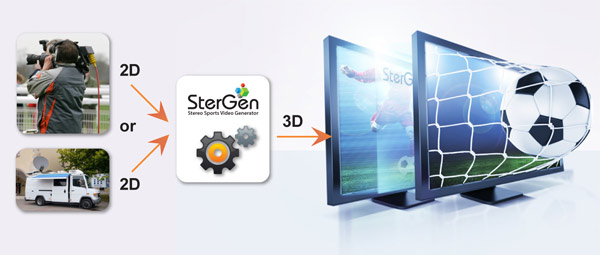
At IBC, SterGen will also unveil its new Tennis Blade, one of several sports blades that provide algorithmic signal processing tailored to the unique attributes of a particular sport. The blades work in conjunction with the SterGen Live Engine, the powerful core stereo 3D processor at the heart of all SterGen products that also supports general purpose algorithms that can convert general scenes (not sport specific) to 3D. SterGen released its football (soccer) blade last spring and has other sports blades in development.
SterGen will also announce its 3D Enhancement offering, which is targeted to native 3D sport production to combat the ‘3D flatness’ experienced during high point of view/wide shots during sporting events. In its 3D enhancement mode, SterGen receives the 3D camera feed and provides real time control over the 3D disparity budget and convergence effect. It provides an optimal 3D viewer experience and allows the broadcaster to create different 3D outputs for multiple screens ‘ TVs, PCs, Tablets and phones.
Compelling value proposition
“With products such as SterGen Live, 3D broadcasts can be produced for a fraction the cost of conventional 3D productions that require expensive dual-camera rigs, highly skilled technicians, and specially designed 3D/HD mobile units,” said Ofer Wolf, Chief Executive Officer of SterGen. “With SterGen’s engine, live 3D production costs can be dramatically reduced, and the volume of 3D program offerings can increase without sacrificing the quality of the stereo 3D experience ‘ providing an attractive new business model for 3D TV broadcasting.
“Improving the quality of the viewer experience is key,” continued Wolf. “Also in a native 3D sport production we’re able to increase the outcome quality. Due to the physical distance from the scene, the stereo 3D cameras dilute the 3D effect on high point of view or wide shots – typically used during the majority of the broadcast. Our software gives the production team full control over the convergence parameters in real-time- regardless of the physical distance between the 3D camera’s left/right lenses – allowing the production to provide an impressive 3D broadcast to the viewer,” concluded Wolf.
SterGen has full operational flexibility, and it can be used anywhere in the stereo 3D production path-including stadiums, studios, cable head-ends, or the IP cloud.
Spurring demand for 3DTV sports
“Market analysts predict that there could be 100 million 3D-capable TV sets in homes worldwide by 2014, with exponential growth well into the future,” said Petter Ole Jakobsen, Vizrt’s Chief Executive Officer. “We at Vizrt immediately recognized that SterGen had a viable, cost-effective solution to many of the creative and financial challenges plaguing live stereo 3DTV production especially for sports.” Vizrt invested in SterGen High-Tech Ltd. in 2010 because 2D to stereo 3D conversion technology complements and expands Vizrt’s own stereo 3D production workflow.
“SterGen software offers sports producers and broadcasters a compelling alternative to expensive, logistically complex live stereo 3D production,” added Jakobsen. “The ease and cost-effectiveness this provides will prove a game changer for 3DTV sports production. We’re extremely pleased to partner with SterGen to offer this exciting realtime 2D to stereo 3D conversion technology as an integrated capability within our digital graphics and production environment.”
For more information: www.stergen.tv; www.vizrt.com.
Sections: Business Technology
Topics: Press Release City
Did you enjoy this article? Sign up to receive the StudioDaily Fix eletter containing the latest stories, including news, videos, interviews, reviews and more.

Leave a Reply